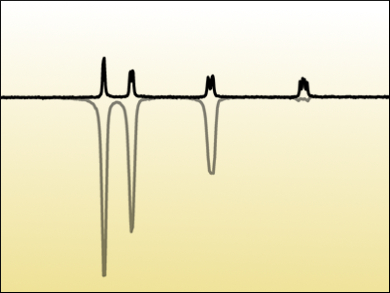To circumvent low sensitivity in NMR studies, hyperpolarization has been used to enhance signals. Signal amplification by reversible exchange (SABRE) is one such NMR technique. SABRE involves nuclear polarization with a polarization transfer catalyst (typically [IrI]) that binds the substrates and para-H2, resulting in hyperpolarized 1H and heteronuclei and thus stronger corresponding signals.
Floris P. J. T. Rutjes, Martin C. Feiters, Radboud University, Nijmegen, The Netherlands, and colleagues have developed a new Ir-catalyst for SABRE that can be applied in the aqueous solvent D2O, whereas only organic solvents could be used previously. Using [Ir(Cl)(IDEG)(COD)] (IDEG=1,3-bis(3,4,5-tris(diethyleneglycol)benzyl)imidazole-2-ylidene), SABRE was observed for pyridine, methyl nicotinate, N-methylnicotinamide, and nicotinamide in D2O.
The exclusive use of D2O during the activation and hyperpolarization steps has resulted in the first fully biocompatible SABRE system. These hyperpolarizations have been achieved by straightforward methods and on relatively inexpensive instruments. The substrate scope suggests that more biologically relevant compounds should be hyperpolarizable in this way, especially for many pharmaceutical drugs, which contain heterocyclic aromatics.
- A New Ir-NHC Catalyst for Signal Amplification by Reversible Exchange in D2O,
Peter Spannring, Indrek Reile, Meike Emondts, Philipp P. M. Schleker, Niels K. J. Hermkens, Nick G. J. van der Zwaluw, Bram J. A. van Weerdenburg, Paul Tinnemans, Marco Tessari, Bernhard Blümich, Floris P. J. T. Rutjes, Martin C. Feiters,
Chem. Eur. J. 2016.
DOI: 10.1002/chem.201601211




